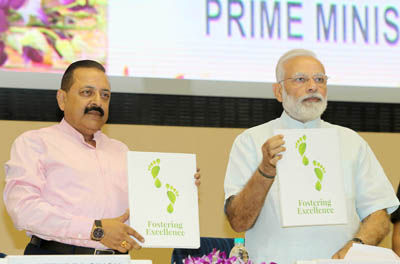
NEW DELHI, Apr 21: Prime Minister Narendra Modi said today he has got a bit extra political will to carry out reforms and asked bureaucrats to break silos and work together as a team to perform and transform the country.
Addressing civil servants, Modi said they do not need to be afraid of any consequences for taking fast decisions as he will stand behind the officers taking honest decisions in public interest.
Modi said political will can reform, but bureaucracy performs and public participation transforms.
“We have to bring them on one wavelength and when we run these three (political will, performance by bureaucracy and public participation) on one wavelength, then we get good results,” he said.
Modi said political will is needed to reform. “I do not lack it and may be having a bit extra,” the Prime Minister said.
He said the civil servants do not need to think that if a decision is taken promptly then there is ill-will behind it.
“If a decision is taken with honest intention, truthfulness and for the welfare of public then there is nobody in the world who can raise fingers at you.
“Something momentary may happen but I am with you,” the Prime Minister said, addressing a Civil Services Day function here, amidst applause from the bureaucrats attending it.
His assertion assumes significance as some bureaucrats have referred to three Cs — the CAG, CBI and the CVC — as stumbling blocks in decision-making, ultimately resulting in policy paralysis.
He asked the civil servants to weigh their decisions from an outcome point of view and not on output.
“Aankado se badlav aata hai kya (Do we get any change through numbers)? We need to weigh decisions from an outcome point of view. Output is okay for the CAG. If we see output with the CAG then there won’t be any change in the country.
“We will neither be able to see any change, nor any change would come in the country. But if we see things from ‘CAG+1′ then there would be changes,” the Prime Minister said, referring to outcome- and output- based decision-making in the government.
He asked the bureaucrats to have out-of-the-box thinking to bring solutions to problems faced by people.
“It will be good if you change your working style and way of your thinking. If you come out of the role of being regulator and act as enabling entity, then challenges would convert into opportunities,” Modi said.
The Prime Minister said that senior officers should refrain from “know-all” syndrome and give a serious thought to new ideas from their juniors.
He said hierarchy in the bureaucracy remains an issue which has been inherited from colonial rulers and “was not left behind in Mussoorie (where the civil service academy is located)”.
Talking about people’s perception towards bureaucracy, he said when bureaucrats are not bad and they are not out to work with some bad will, then what is the reason that common man instead of having a “feeling” (bhaav), has “abhaav” (complaint)?
“What is the reason? We must introspect and if we do that, then I don’t feel we need big changes (in changing people’s perception),” Modi said.
He said people clap when army saves lives during flood in Kashmir. “The same people may later pelt stones at them but for a moment this deed (of army men) touch them,” the PM said.
Modi said bureaucrats do not need to work in silos, but work together as a team. He said it is a matter of concern when he sees two departments of the same government having divergent views in courts over some matters.
“On this day, we need to think that do we accept our weakness or somebody running away from his responsibilities? Or some ego is coming in way? It should be a matter of introspection on this Civil Services Day. These are handicaps in meeting the needs of common people,” he said, asking the bureaucrats to take responsibilities for works being done by them.
The Prime Minister said civil servants need to take a vow to make India as per the dreams of freedom fighters by 2022.
“It should be responsibility of all to take the vow as to how they can make India a super power in the world by 2022,’ he said. (PTI)

